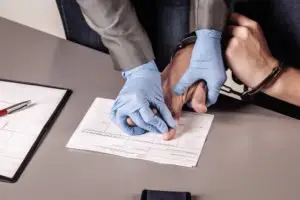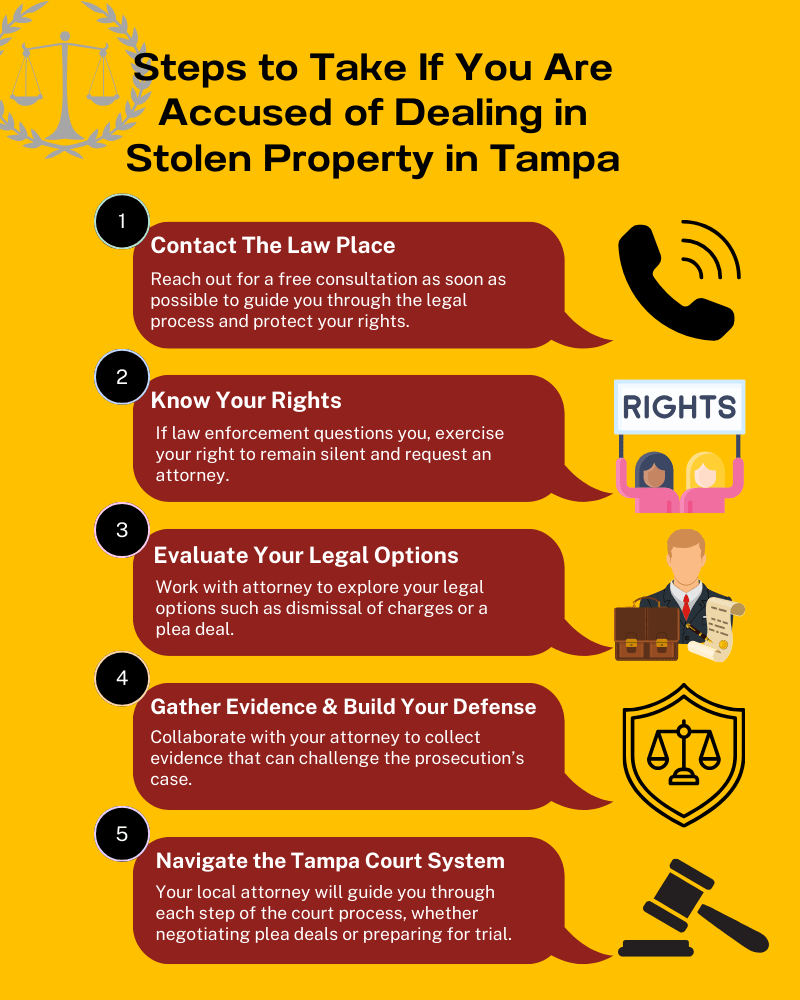
According to Florida law, it is a criminal offense for a person to traffic, or endeavor to traffic, stolen property. This includes property that they knew was stolen or should have reasonably known was stolen. This offense is classed as a second-degree felony punishable by harsh penalties, including up to 15 in prison if you are convicted.
Here at The Law Place, we understand that you may have a valid defense or may even have been wrongly accused of this offense, and our team of experienced criminal defense attorneys can help.
If you have been arrested for or are under suspicion of dealing in stolen property in Tampa, Florida, you will be set to face an aggressive prosecution. So, it is in your best interest to seek legal representation straight away. Our criminal defense team at The Law Place has a combined experience of 75 years. We work tirelessly to defend our clients’ rights when they have been accused of serious crimes, such as this, and can fight for the best possible outcome for you.
For a free consultation, call us today at (941) 444-4444. A Tampa criminal defense attorney is available 24 hours a day, 7 days a week.

Steps to Take If You Are Accused of Dealing in Stolen Property in Tampa
The Attorneys at The Law Place: Defending Dealing in Stolen Property Charges
At The Law Place, our experienced attorneys are committed to providing a strong defense for clients facing serious charges like dealing in stolen property. David A. Haenel has a long history of defending individuals in complex criminal cases. With his background as a former State Prosecutor of the Year, David brings a deep understanding of the strategies used by the prosecution, enabling him to craft tailored defenses that protect his clients’ rights and minimize potential penalties.
Darren Finebloom, another key attorney at The Law Place, is known for his dedication to securing favorable outcomes for his clients. Darren has successfully tried over 75 cases to a jury, demonstrating his commitment to achieving the best possible results. His extensive courtroom experience and skill in defending property crime cases make him an invaluable asset to anyone facing charges of dealing in stolen property. Together, David and Darren form a formidable defense team, ready to fight for you.

How the Crime of Dealing in Stolen Property is Defined Under Florida Law
The definition of this crime can be found under Florida Statute 812.019. It states that any person who sells, transfers, distributes, or disposes of stolen property, knowing that it was stolen (or where they should have known it was stolen), is committing a criminal offense.
To establish that a defendant is guilty of the crime of dealing in stolen property beyond a reasonable doubt, the prosecution must prove the following elements at the criminal trial.
- The defendant trafficked the alleged property or endeavored to traffic the alleged property.
- The defendant was aware or should have been aware that the property was stolen.
 We’re here to serve you. Our phones are open 24 hours a day.
We’re here to serve you. Our phones are open 24 hours a day.
Important Terms Within Florida Statute 812.019
- “Property” – This refers to anything that is of value. It includes actual property (anything growing on, found on, and fixed to land), and intangible or tangible property such as privileges, rights, claims, and services.
- “Stolen Property” – This refers to any property that has been wrongfully, criminally, taken, and any property that was offered for sale to the defendant that was clearly and openly stolen.
- “Traffic” or “Trafficking” – This refers to any property that has been sold, transferred, dispensed, dispatched, or disposed of by the defendant. It also refers to the buying, selling, possessing, receiving, use of, or obtaining control of the property with the intent to sell, transfer, dispense, dispatch, or dispose of it.
If you simply purchased the stolen property and had no intention to sell it, you will not be found guilty under this statute because as does not constitute dealing in stolen property. However, you may face charges of petit or grand theft.
 We’re Florida’s top litigation team with over 75 years of combined experience
We’re Florida’s top litigation team with over 75 years of combined experience
The Penalties for Dealing in Stolen Property in Tampa, Florida
Most people in Tampa, FL., are not aware of the serious consequences of this crime. According to Florida’s Criminal Punishment Code, the offense of dealing property that was acquired as a result of theft is classed as a second-degree felony and assigned as a level five offense in severity ranking
If you are successfully convicted of dealing in stolen property in Tampa, FL., a judge can impose any one, or a combination of, the following penalties:
- Up to 15 years in prison.
- Up to 15 years of probation.
- A fine of up to $10,000.
- An adjudication of guilt on your record that cannot be expunged.
This crime can be upgraded to a first-degree felony if the defendant is proven to have initiated, organized, planned, financed, managed, or supervised the theft, and then trafficked the stolen property. A first-degree felony is punishable by up to 30 years in prison and a fine of up to $10,000.
The court is very likely to increase the penalty if you are shown to be a habitual offender. Florida Statute 775.084 states that the court has the liberty to increase a sentence if you have been previously convicted of dealing in stolen property or theft of property.
 From the initial call to updates on your case status, we are here to get you answers.
From the initial call to updates on your case status, we are here to get you answers.
Inferences of Knowledge
Proof of knowledge in dealing with stolen property cases is a required element to establish the accused person’s guilt. However, certain facts surrounding the case can give rise to an inference of knowledge under Florida Statute 812.022. For example:
- Possession of Recently Stolen Property – Under Florida Statute 812.022, if there is proof that you are in possession of the stolen property, this is enough to give rise to an inference of the knowledge that the property was stolen.
- Purchase of Goods Below Fair Market Value – If there is proof that the defendant purchased the stolen property substantially below the current market value, unless they can explain why they were able to acquire it at this price, it gives rise to an inference of knowledge.
- Unusual Sale – Where there is proof that the defendant purchased the stolen property from a dealer who was not in the regular course of business or without indication of legal ownership. Unless sufficiently explained, this gives rise to an inference of knowledge.
- Ignoring Owner’s Name – If there is proof that a dealer who habitually deals in used property is in possession of the stolen property, upon which the name and phone number of a person other than those offering the property are conspicuously displayed, this gives rise to an inference of knowledge, unless this can be reasonably explained.
- Ignition Bypass on a Vehicle – In the case of a stolen motor vehicle, proof that the ignition mechanism had been bypassed or the steering wheel locking system had been broken or bypassed gives rise to an inference of knowledge that the motor vehicle was acquired through theft.
Defenses to Your Dealing in Stolen Property Charge
You could avoid being convicted of this charge if you can offer a satisfactory explanation as to how you came to acquire the stolen property, and how you did not know that the property was stolen. If you can provide this, your charges could even be dropped. Although this sounds simple, to successfully have your charges reduced or dismissed, you will need to appoint an attorney to defend you.
There are several options available to you when it comes to a legal defense. A prosecutor will suggest that the defendant should have known the property was stolen. But, for example, if you purchased a car for a lower price from a trusted friend, you would have no reason to suspect that property theft took place.
Some of the most common defenses available in a case such as this are:
- Complete lack of knowledge that the property had been previously stolen.
- You were pawning the property at the request of someone else, without knowing where it had been obtained.
- The property was not trafficked as defined in Florida Statute 812.019.
- The property was not stolen.
- A mistaken belief as to your right to dispose of the stolen property.
- Sufficient arguments against any inferences of knowledge put forward by the prosecution.
- The mistaken belief that the property was gifted or abandoned.
- Mistaken identity with regards to the property’s ownership.
- False claims from the alleged victim with regards to ownership.
- Lack of evidence that the property is stolen.
Ultimately, a Tampa criminal defense attorney will look for any weaknesses in the prosecutor’s case. With the help of a skilled defense lawyer from our law firm, the best defense can be put forward for you.
How Soon Should You Hire an Attorney?
In any criminal case, the answer to this question is always simple; the sooner you hire an attorney, the better your chance of a positive outcome will be.
Many defendants assume they can talk their way out of their charges, when in fact, that often makes things worse for themselves. You have the right to request a lawyer from the very beginning and do not have to answer law enforcement questions before you have one.
The right attorney will begin collecting evidence before it gets lost or destroyed and can begin requesting and reviewing any police reports, as well as researching case statues and precedents. They can prepare to examine witnesses at any hearings and trials and put together a comprehensive defense to the judge and jury. The sooner they can get started on this, the better!
You will do yourself an injustice by wasting any time seeking legal representation, so don’t hesitate to call The Law Place today!
The Benefit of a Local Tampa Attorney for Dealing in Stolen Property Cases
When you’re facing dealing in stolen property charges in Tampa, having a local attorney from The Law Place provides you with distinct advantages. Our attorneys have a deep understanding of Florida’s criminal laws and are well-acquainted with the specifics of how the legal system works in Hillsborough County and Tampa. Here’s how that local knowledge can be crucial to your defense:
Familiarity with Local Courts and Judges
Attorneys like David A. Haenel and Darren Finebloom are familiar with the inner workings of Hillsborough County Court and Tampa’s criminal court system, including the judges who preside over criminal cases. For example, understanding the tendencies of a specific Judge in Hillsborough County can allow our attorneys to adjust their defense strategies accordingly – whether that means knowing how a Judge typically rules on pretrial motions or what types of arguments resonate best in the courtroom. This familiarity can be the key to negotiating better plea deals or advocating effectively at trial.
Access to Local Diversion Programs
Tampa offers unique opportunities for alternative sentencing and diversion programs that a local attorney can help you explore. For example, Hillsborough County’s Pretrial Intervention Program (PTI) allows eligible first-time offenders the chance to avoid a conviction by completing certain conditions such as community service, restitution, or counseling. Attorneys from The Law Place, with their local experience, can advocate for your participation in these programs, potentially helping you avoid jail time.
Connections with Tampa Law Enforcement
In property crime cases, the way evidence is collected and presented is critical. Our Tampa attorneys have worked extensively with local law enforcement, including the Tampa Police Department and the Hillsborough County Sheriff’s Office, and they know how these agencies typically handle investigations. This insight allows us to identify any procedural errors or violations that may weaken the prosecution’s case. For instance, if evidence was mishandled or if a search warrant wasn’t properly executed, our attorneys can use this local knowledge to your advantage.
Utilizing Local Experts
In cases involving the value or ownership of stolen property, expert witnesses can be essential. At The Law Place, we have strong connections with local Tampa experts in fields such as property appraisal, forensic analysis, and investigative procedures. These experts can provide testimony to dispute the prosecution’s claims or bolster your defense, giving you a better chance at a favorable outcome.
Navigating the Local Jury Pool
An experienced Tampa attorney is familiar with the local jury pool and knows what type of arguments and presentation will resonate with a Hillsborough County jury. Understanding the makeup of the local community allows us to tailor our defense in a way that appeals to local values and perspectives, giving you the best chance in court.
Resources for Individuals Facing Dealing in Stolen Property Charges in Tampa
If you are accused of dealing in stolen property in Tampa, the following resources can help you navigate the legal process and support you through challenging times:
- The Law Place – Schedule a free consultation with skilled criminal defense attorneys experienced in handling stolen property cases, who can guide you through your defense options.
- Hillsborough County Sheriff’s Office – Provides resources for those involved in legal matters, including arrest records, case status information, and community resources.
- Florida Statutes on Theft Crimes – Access Florida’s official state statutes, which provide legal definitions, penalties, and classifications for theft and property-related offenses.
These resources provide essential information and legal assistance, helping you make informed decisions as you face stolen property charges.
Tampa Dealing in Stolen Property Lawyer: Frequently Asked Questions
What is considered stolen property dealing in Tampa?
In Tampa, stolen property dealing involves knowingly selling, buying, or trafficking in property that has been illegally obtained. This encompasses a range of activities from direct selling of stolen goods to facilitating transactions involving such property.
What is the role of the state attorney’s office in cases of dealing in stolen property?
The state attorney’s office in Tampa is responsible for prosecuting theft crimes, including cases of dealing in stolen property. They assess evidence, file charges, and represent the state in criminal proceedings against individuals accused of these offenses.
How are theft charges classified in Tampa?
Theft crimes in Tampa are classified based on the value of the stolen property and the circumstances of the theft. This ranges from petit theft (involving lower-value items) to grand theft (involving higher-value items or certain specified properties).
What constitutes a grand theft offense in Tampa?
Grand theft in Tampa is defined as the unlawful taking of property valued at more than $750. Such stolen property results in a more serious charge than petit theft and can result in harsher penalties, including significant fines and imprisonment.
What are the legal implications of possessing recently stolen property in Tampa?
Possessing recently stolen property in Tampa can lead to criminal charges, as it may be presumed that the possessor knew or should have known that the property was stolen. This presumption can lead to charges of dealing in stolen property or receiving stolen goods.
What are the penalties for dealing in stolen property as a third-degree felony in Tampa?
Dealing in stolen property as a third-degree felony in Tampa can result in penalties including up to 5 years in prison, 5 years of probation, and a $5,000 fine. The severity of the punishment may depend on the specifics of the case and the individual’s criminal history.
How is petit theft defined and penalized in Tampa?
Petit theft in Tampa involves the unlawful taking of property valued at less than $750. It is generally considered a misdemeanor, with penalties including fines, probation, and potentially jail time, depending on the value of the stolen property and prior offenses.
What defense strategies might be used for theft offenses in Tampa?
Theft crime defense strategies can include challenging the evidence of ownership, disputing the value of the stolen property, arguing lack of knowledge that the property was stolen, or proving that the accused had a valid claim to the property.
How can a lawyer assist with my theft crime cases?
A Tampa dealing in stolen property lawyer can provide legal representation, offer advice on the best course of action, negotiate plea deals, and present a defense in court. They can challenge the prosecution’s evidence and work to achieve a reduction or dismissal of charges.
Speak to One of Our Tampa Theft Crime Attorneys Today
Our law firm is always committed to its clients from the very beginning and can offer an attorney-client relationship that is built on trust. We can put forward a comprehensive defense for any person who has found themselves facing serious felony charges in Tampa.
The Law Place is no ordinary law practice. Our defense attorneys work as a team, meaning you benefit from their combined experience and wealth of knowledge. We understand that you may be feeling very anxious at the thought of a criminal trial, so don’t waste any time. Call The Law Place today at (941) 444-4444 for a free consultation with an experienced criminal defense attorney.





